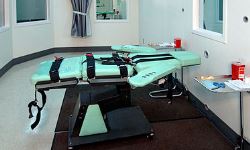The participation of nurses in legal executions is a dilemma for the profession and a Charles Sturt University (CSU) academic believes we shouldn't shy away from debating the issue.
 Professor Linda Shields from CSU's Faculty of
Science, is internationally recognised for her research on the history of
nursing ethics.
Professor Linda Shields from CSU's Faculty of
Science, is internationally recognised for her research on the history of
nursing ethics.
She's the lead author of an opinion paper 'Nurse participation in legal executions: An ethics round-table discussion' published in Nursing Ethics.
"This paper brings together the views of 12 senior nurses from Australia, the United States and United Kingdom discussing the ethics of nurses being part of the process of executing a person condemned to die," Professor Shields said.
"Our intention is to highlight to the nursing world that this is occurring, to show a range of opinions and stances and to initiate discussion, argument and analysis of the topic."
Professor Shields said in the United States nurses are involved in executions by inserting intravenous lines so doctors can give the lethal injections.
"The International Council of Nurses, Australian College of Nursing and other nursing organisations around the world, including in the USA say very strongly that this is very wrong," Professor Shields said.
"An American nurse interviewed about why she participated in this way said it was no different to giving palliative care to people who were dying from natural causes, and that if she didn't do it then someone unqualified may have to do it and the condemned person might suffer.
"Amongst the nurses contributing to our paper there's divergence of opinions, with some saying that all people, regardless of circumstance, should be given the best care possible at the end of their lives.
"Others said that such rationales were the same used by nurses who actively killed their patients in the Nazi 'euthanasia' programs.
"An interesting perspective is that most of the authors live in countries where capital punishment is not legal; however, some seemed to agree that the nurse must give end-of-life care to the condemned prisoner.
"Many of those who expressed the opposite, that nurses should never be involved in executions, lived in countries where capital punishment was legal.
"While this very small sample, and the opinions expressed are certainly not representative of all nurses, perhaps it is time to do some research around this question and examine what might influence a nurse to participate or not in executions."
The paper also includes comment from Head of CSU's School of Nursing, Midwifery and Indigenous Health, Professor Catherine Hungerford and CSU senior lecturer in nursing, Dr Judith Anderson.





Social
Explore the world of social